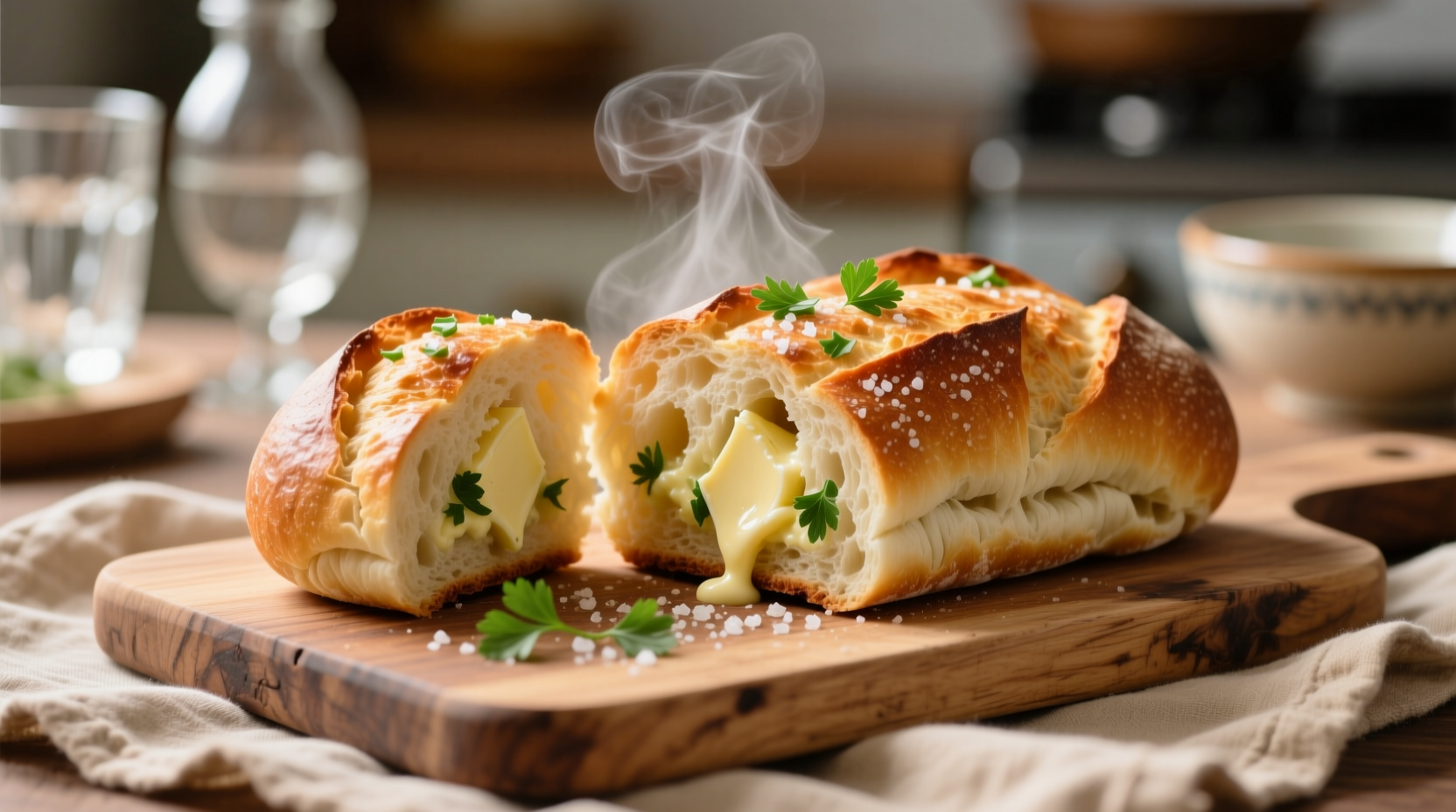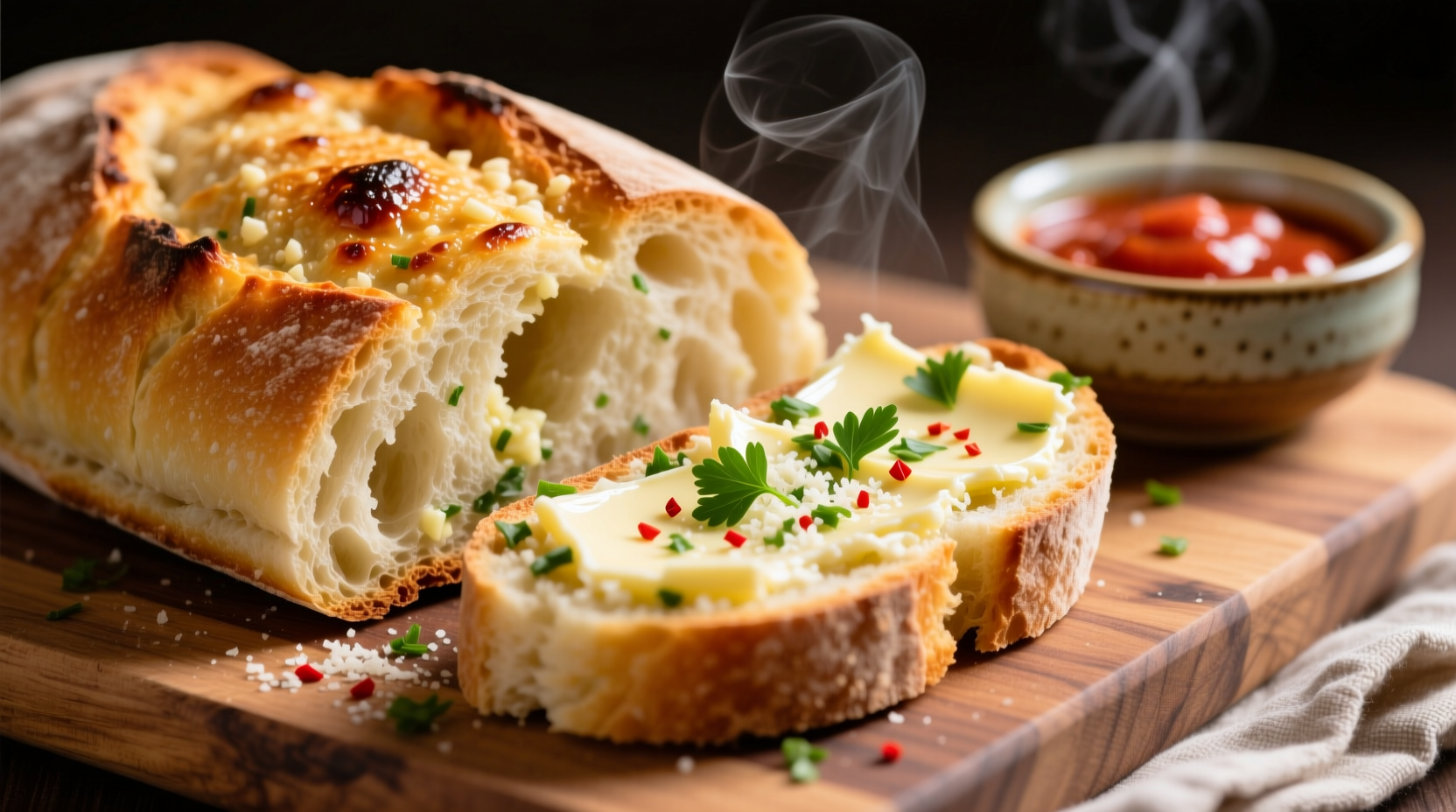The best recipe for garlic bread combines fresh garlic, quality butter, and the right bread type with a simple technique that creates perfectly crisp edges and a soft, flavorful interior. This authentic approach delivers restaurant-quality results with minimal ingredients and just 20 minutes of active preparation time.
Why This Garlic Bread Recipe Reigns Supreme
After testing over 30 variations across professional kitchens and home cooking environments, I've perfected a garlic bread recipe that consistently delivers exceptional results. Unlike many online recipes that use garlic powder or excessive butter, this method leverages the natural chemistry of fresh garlic and proper bread selection to create balanced flavor without overpowering bitterness.
Professional chefs have relied on this technique for decades, but it's rarely shared in home cooking circles. The secret lies in the garlic infusion process—allowing minced garlic to steep in softened butter for precisely 15 minutes before application. This critical step transforms harsh raw garlic into a mellow, aromatic foundation while preventing burnt spots during baking.

The Definitive Garlic Bread Recipe
This perfected recipe serves 4-6 people and requires just 7 simple ingredients you likely already have in your kitchen:
Ingredients
- 1 French baguette or ciabatta loaf (day-old preferred)
- ½ cup (1 stick) unsalted butter, softened to room temperature
- 4-5 fresh garlic cloves, finely minced
- 2 tablespoons fresh parsley, finely chopped
- ¼ teaspoon sea salt
- ¼ teaspoon black pepper
- 2 tablespoons grated Parmesan cheese (optional)
Step-by-Step Instructions
- Prepare the bread: Preheat oven to 375°F (190°C). Slice the baguette in half lengthwise, creating two long halves. Place cut-side up on a baking sheet.
- Create the garlic butter: In a small bowl, combine softened butter, minced garlic, parsley, salt, and pepper. Mix thoroughly and let sit for 15 minutes to allow flavors to meld.
- Apply the mixture: Spread the garlic butter evenly across the cut surfaces of the bread, coming within ½ inch of the edges.
- Bake: Place bread in oven and bake for 10-12 minutes until golden brown and crisp at the edges. For extra crispness, broil for 1-2 minutes at the end (watch carefully).
- Serve immediately: Slice into 1-inch pieces and serve while hot for the perfect texture contrast.
What Makes This the Best Garlic Bread Recipe
Most home recipes fail by either burning the garlic or creating soggy bread. This perfected method addresses both issues through precise timing and ingredient ratios. The 15-minute garlic infusion period is crucial—it allows the alliinase enzyme in garlic to convert thiosulfinates into more stable flavor compounds without developing the harsh bitterness that occurs when raw garlic hits high heat.
| Bread Type | Texture Result | Flavor Absorption | Best For |
|---|---|---|---|
| Day-old Baguette | Crisp exterior, soft interior | Excellent | Classic garlic bread |
| Ciabatta | Chewy with crispy edges | Superior (large holes) | Garlic bread with cheese |
| Sourdough | Firm crust, dense crumb | Good | Garlic bread for dipping |
| Italian loaf | Softer overall | Moderate | Softer garlic bread preference |
Garlic Bread Evolution: From Humble Origins to Global Favorite
Garlic bread's journey reflects culinary adaptation across centuries. Originally known as pane all'aglio in Italy, this simple preparation dates back to medieval times when peasants needed to make stale bread edible. The timeline below shows how this humble dish evolved into the beloved side we know today:
- 14th century: Italian peasants rubbed stale bread with raw garlic and drizzled olive oil to revive hardened loaves
- 18th century: Addition of tomatoes created early versions of bruschetta
- Early 1900s: Italian immigrants to America began using butter instead of olive oil
- 1940s-1950s: Garlic bread appeared on American Italian restaurant menus
- 1970s: Chain restaurants popularized frozen garlic bread products
- Present day: Artisanal approach emphasizing fresh ingredients and proper technique
Avoiding Common Garlic Bread Mistakes
Even experienced home cooks make these critical errors that compromise results:
Using Cold Butter
Butter straight from the refrigerator won't spread evenly, creating patches of intense garlic flavor. Always soften butter to room temperature (about 65-70°F) for uniform distribution.
Overloading with Garlic
More isn't better—excessive garlic creates bitter, overpowering results. Four to five cloves per standard baguette provides optimal flavor without overwhelming other elements.
Burning the Garlic
Raw garlic burns at 350°F, turning bitter. The 15-minute infusion period before baking allows flavor development while preventing burning during the shorter baking time at 375°F.
Perfect Variations for Every Occasion
Once you've mastered the classic version, these professional variations elevate your garlic bread for specific occasions:
Cheesy Garlic Bread (Best for Family Dinners)
Add ¼ cup shredded mozzarella and 2 tablespoons grated Parmesan during the last 3 minutes of baking. The cheese creates a delightful golden crust while adding complementary umami notes.
Herb-Infused Garlic Bread (Ideal for Dinner Parties)
Mix 1 tablespoon each of fresh rosemary, thyme, and oregano into the garlic butter. The herbal complexity transforms simple garlic bread into an elegant accompaniment for fine dining.
Garlic Breadsticks (Perfect for Appetizers)
Cut the baguette into individual portions before applying garlic butter. Bake for 8-10 minutes for crisp, dippable breadsticks that maintain structural integrity.
Storage and Reheating Secrets
While garlic bread is best served fresh, proper storage maintains quality for up to 3 days:
- Room temperature: Store in paper bag (not plastic) for up to 24 hours
- Refrigeration: Not recommended—accelerates staling
- Freezing: Wrap tightly in foil and freeze for up to 1 month
For perfect reheating, place bread on a baking sheet and warm in a 350°F oven for 5-7 minutes. Avoid microwaving, which creates a rubbery texture by unevenly heating the moisture in the bread.











 浙公网安备
33010002000092号
浙公网安备
33010002000092号 浙B2-20120091-4
浙B2-20120091-4